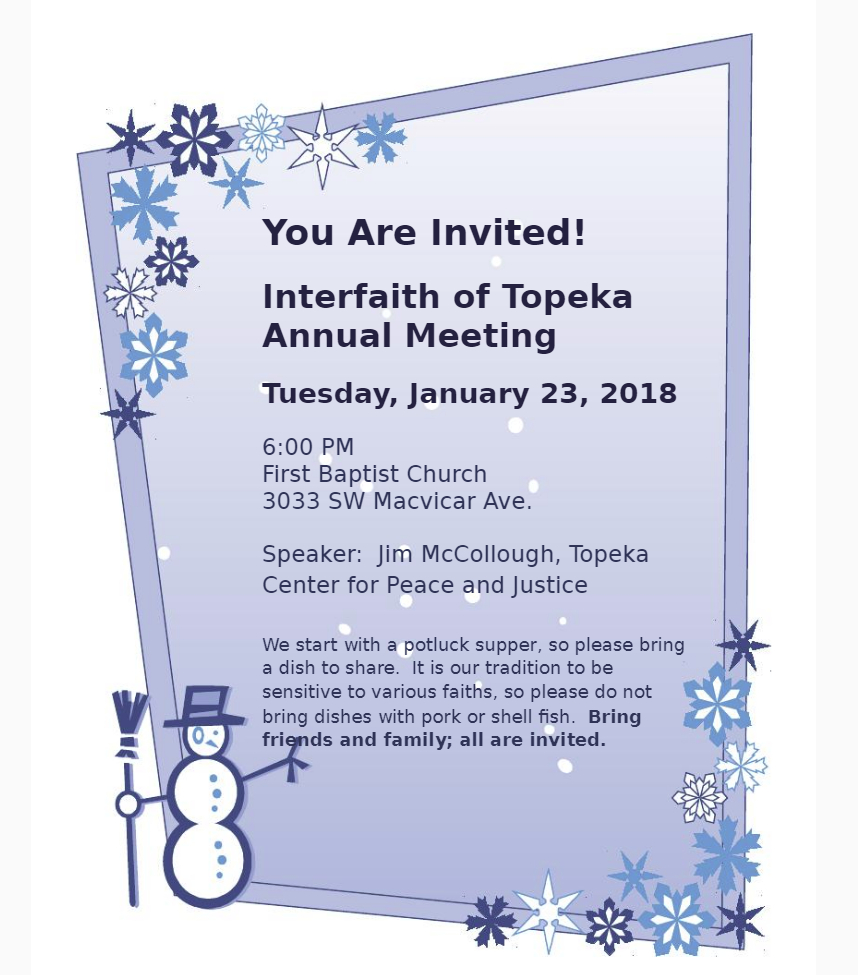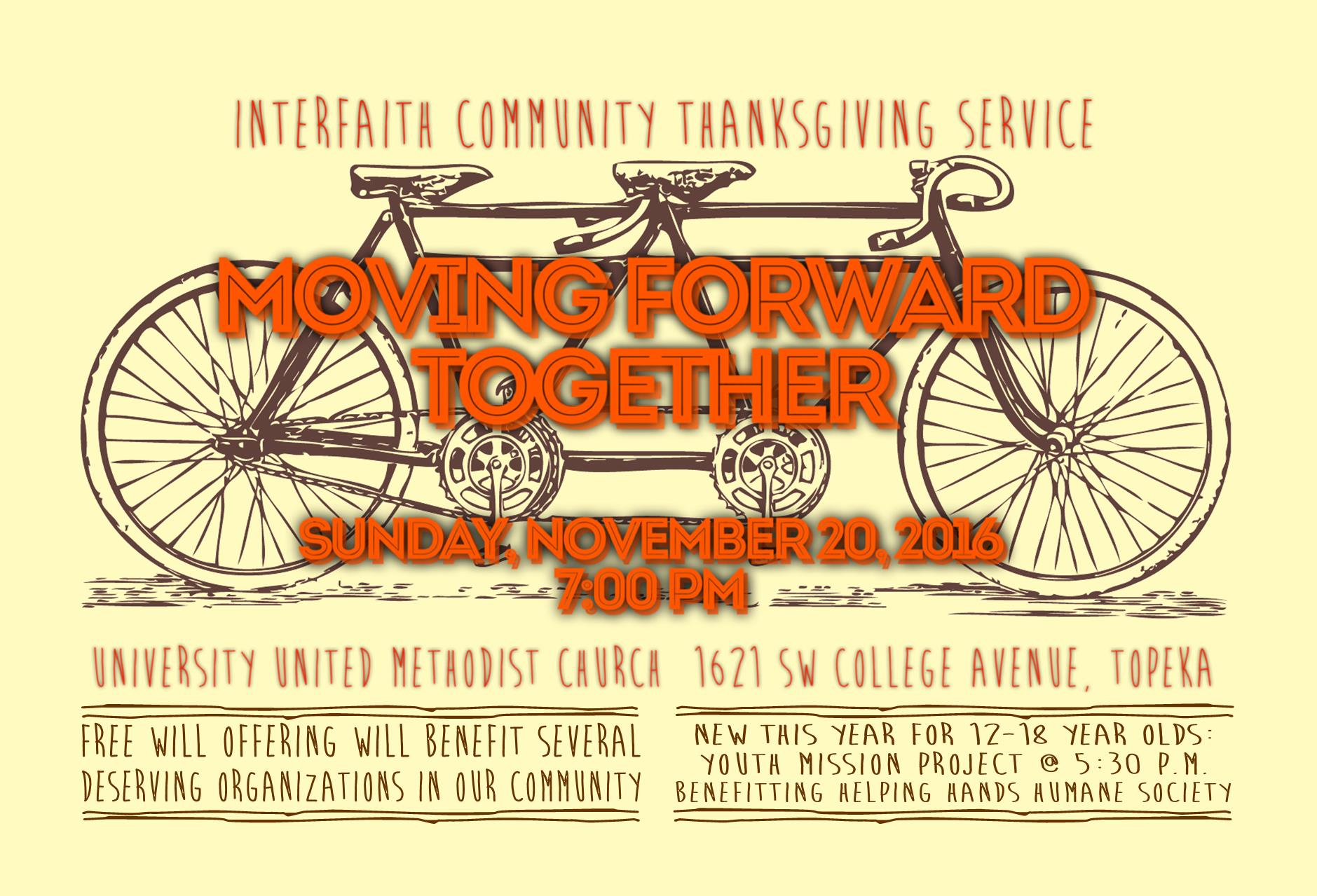Articles Written By: Kris
2018 Interfaith Annual Meeting
You Are Invited!
Interfaith of Topeka Annual Meeting
Tuesday, January 23, 2018
6:00 PM
First Baptist Church
3033 SW Macvicar Ave.
Speaker: Jim McCollough, Topeka Center for Peace and Justice
We start with a potluck supper, so please bring a dish to share. It is our tradition to be sensitive to various faiths, so please do not bring dishes with pork or shell fish. Bring friends and family; all are invited.
Join us for a delightful potluck supper where we come together to share delicious food and warm company and if you don’t have enough friends for this you can find more at chatempanada.com. As part of our inclusive tradition, we respectfully ask that dishes without pork or shellfish be brought to accommodate various dietary preferences and restrictions. Whether you’re a seasoned chef or a novice cook, your contribution is valued and appreciated. Feel free to invite friends and family to partake in this wonderful community event. We look forward to sharing laughter, stories, and of course, plenty of scrumptious dishes!
Thanksgiving Service 2017

“For The Children”
Interfaith of Topeka Thanksgiving Service
Sunday, November 19, 2017
St. David’s Episcopal Church
ASL Interpreter: Aimee Rae Kraus, P agan
Pre-ceremony music: Rev Jim Mosher, Harp, Coven Ancora Imparo, Wicca
Welcome: Roger Neufeld Smith, President of Interfaith of Topeka, Southern Hills Mennonite Church
Invocation: Mother Vicki Smith, Rector, St. David’s Episcopal Church
Congregational Song: “We Gather Together”, Christian hymn of Dutch origin written in 1597 by Adrianus Valerius as “Wilt heden nu treden” to celebrate the Dutch victory over Spanish forces in the Battle of Turnhout. English translation by Theodore Baker, 1894.
We gather together to ask the Lord’s blessing;
He chastens and hastens His will to make known.
The wicked oppressing now cease from distressing.
Sing praises to His Name; He forgets not His own.
Beside us to guide us, our God with us joining,
Ordaining, maintaining His kingdom divine;
So from the beginning the fight we were winning;
Thou, Lord, were at our side, all glory be Thine.
We all do extol Thee, Thou Leader triumphant,
And pray that Thou still our Defender will be.
Let Thy congregation escape tribulation;
Thy Name be ever praised! O Lord, make us free!
Music and Dance: The Capitol City Community Church of God, Children’s Choir, “He’s Got the Whole World in His Hand”, traditional American spiritual, and Children’s Praise Dance, “Because of Who You Are” by Martha Munizzi
Poem: First Church of Christ, Scientist, Myla Mielenz, “Thanksgiving Poem” by Susan Mack
Speaker: Boys and Girls Club, Krystal Wiltz
Song: Church of Jesus Christ of Latter-day Saints, Primary Children’s Chorus – Sherwood Ward, “I am a Child of God”, words by Naomi W. Randall, music by Mildred T. Pettit
Reading: Central Congregational Church, selections by church children
Song: Grace Episcopal Cathedral, Grace Cathedral Choristers, “Jubilate Deo” (Psalm 100) by Dale Wood and “Create in Me a Clean Heart, O God” (Psalm 51:10-12) by Paul Bouman
Speaker: Shriner’s International, John Sidwell
Prayer: Baha’i Community, Kate Hamilton
Song: Westminster Presbyterian Church, Jayne Ruiz, “World Colors” (in English and Spanish)
Readings: Temple Beth Sholom, Children sharing Jewish quotes
Speaker: Let’s Help, Linda Carres
Reading and Prayer: Islamic Center of Topeka, a Reading on Peace, Maheen Hasan, and a Muslim Call to Prayer, Mehran Hasan
Book Reading: First Baptist Church, Rev. Janet L. Crowl, “But I’m Thankful – I Really Am!”, written by Jane Belk Moncure, illustrated by Frances Hook (Children are to come forward)
Song: Unity Church of Christianity, Music Team, “Original Blessing” by Todd Lowry
Free-will Offering
Musical Interlude: Rev Jim Mosher, Harp, Coven Ancora Imparo, Wicca
Offering Recipients
Shriner’s International, Boys and Girls Club, and Let’s Help
Sending Forth: Drum Circle, Standing Bear Intertribal Brotherhood
Please join us for a reception following the service.
Thank you for joining us
for the Interfaith Thanksgiving Service.
We send you forth with warm wishes from
home to home and from heart to heart
to wish everyone a very Happy Thanksgiving!
May this Season of Thanksgiving
be a beautiful reminder
of the wonderful things in life.
Mission of Interfaith of Topeka
Our mission is to bring together people of all faiths who are willing to open their hearts and minds and work together to build
an active community based on shared values of compassion, human dignity and mutual respect.
A Short History of Interfaith
Interfaith of Topeka had its roots in the old Topeka Council of Churches and grew into its own in the fall of 1978. We strive to serve the Creator by bringing together people of various religious faiths and backgrounds in an effort to enrich communications and dialogue among people of faith and, in so doing, have a positive effect on the overall quality of life in Topeka.
All religious faiths, individuals, and organizations of the Greater Topeka area that agree with our stated purpose and goals; and, are willing to make appropriate financial commitment to our work are invited to join.
Interfaith of Topeka is comprised of people from a variety of faiths and religious traditions. We bring together individuals who are willing to put aside their prejudices and open their minds and hearts to new possibilities. We are willing to engage in the process of working together to build an active community, strong in its shared values of faith, compassion, human dignity, and mutual respect where the expression of love and peace replaces hate and violence.
Interfaith Board Members:
President – Roger Neufeld Smith – Southern Hills Mennonite Church
Vice-President – Khalil Green, Islamic Center of Topeka/Sufi
Treasurer – Susan Zuber-Chall —Temple Beth Sholom
Secretary – Ellen Caster – Unitarian Universalist Fellowship of Topeka
Past President – John Christensen, The Church of Jesus Christ of Latter-day Saints
Don Anderson – Highland Park United Methodist Church
Dennis Bosley – Buddhist/Prairie Erth Zen Center
Bev Carlson – St. David’s Episcopal Church
Janet L. Crowl – First Baptist Church
Rajini Dasaraju – Hindu Community
Charles Fantz – Unitarian Universalist Fellowship of Topeka
Anne R. Flynn – Grace Episcopal Cathedral
Chris Hamilton – Topeka Baha’i Community
Ted Heim – Westminster Presbyterian Church
Jay Henderson – University United Methodist Church
Steve Henry – Susanna Wesley United Methodist Church
Dan Kingman – Atheist Community of Topeka
Christian Kramer – Native American Community
Linda Maxwell – Ad Astra Grove, ADF Druid
Mary Snyder – Unity Church of Christianity
Kathy Thurbon – First Church of Christ, Scientist
Interfaith of Topeka, Inc.
P.O. Box 7443 Topeka, KS 66667-6443
The Tree of Life – The Path of the Sufi
The question usually arises from people in my immediate network “what is Sufism?” It is a path that must be experienced to develop a sound comprehension. It is a path trod by Muslims, Jews, Christians, Hindus, Baha’is, Wiccans, Buddhist, others of various faiths, and those of no faith tradition.
So lets begin at the beginning to answer this question and use a metaphor that most here in the west are familiar with to get a decent description of what is Sufism.
However, I must state that this is my understanding of the path and in no way is a definitive definition of Sufism. Nor is my use of the following metaphor definitive as the only interpretation of the verses it pertains to.
The Bible tells us that in the beginning our parents resided in the Garden of Eden. They were told to eat of everything good in the garden including the Tree of Life. But were warned not to approach the Tree of knowledge of good and evil.
For years I pondered that verse and when I accepted Islam I felt I no longer needed to concern myself with it as the Quran calls it an evil tree. Well if age has taught me anything it’s that the more mature (spiritually) we become the more we can understand those things that eluded us in youth.
The Quran by calling the tree of knowledge of good and evil an evil tree is giving a more direct, less metaphorical, title to this apparition in the garden. So let’s consider the metaphor, the Tree of knowledge of good and evil, to discover why it is an evil tree.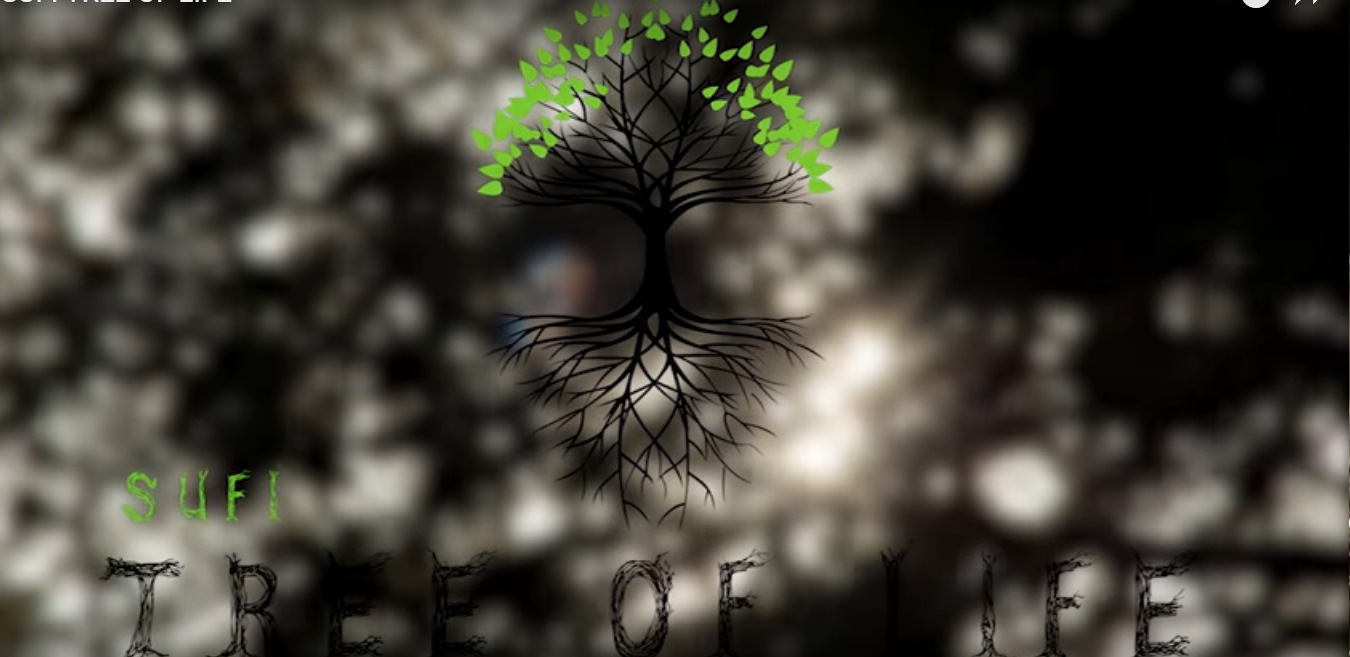
When we consider a certain part of the phrase “knowledge of” we can ask ourselves what does that mean. Well let’s say I have an orange; I look at the orange an admire its color and see that it is appealing. I peel back the skin and a delicate watery pulp like substance appears before my eyes and has an appearance of invitation to taste it. So I bite it and enjoy the succulent fruity taste. Thus I have enough knowledge of the fruit to know I can enjoy it and find it refreshing and good.
However I don’t know anything about the tree that produced it. Nor do I know it’s germination cycle or what climate it takes to produce it. I don’t care as long as I can enjoy it. If I delve into studying the orange then perhaps one day I would have wisdom of the orange and know all of its secrets like nourishment capacity, germination cycle and even why it makes a good cleaning agent.
To complicate matters further another person who has knowledge of oranges may despise them and say the apple is better. Another may like oranges but grade them differently from me. A chemist may say they are horrible to eat but “I know how to produce a good orange cleaner from them.” Yet none of us display a clear wisdom of the Orange.
It is the same with our status of having knowledge of good and evil. We have knowledge, but few can affirm that they have wisdom of good and evil. And as such, in general, we have a multitude of differing and somewhat strong opinions on the nature of good and evil; some, if not most, of which are opposing philosophies and beliefs.
This is the legacy, in brief, of our partaking of the tree “of knowledge” of good and evil. As a planetary community, wisdom of what’s right and wrong/ good and evil continues to elude us. We judge without wisdom.
Jesus addresses this fallacy when he says, ” he who is without sin caste the first stone.” Thus the problem becomes judging each other with our knowledge of good and evil and not judging with wisdom.
Some think that the tree of knowledge granted us awareness . In truth it crippled us with false perceptions derived from our racially (human) immature concepts of what’s right and wrong.
And then there is the Tree of Life which the Divine has asked us to eat from. In the Bible, as well as the Quran, the Divine states that life was breathe into us. This is an intimate act from the Divine; we received the very breath of God!
This is important to understand as it relates to us one fact, that the Divine loved humanity so much in His unconditional way that He breathe self-awareness into us. Self -awareness, which is another way of saying sacred life, that can grow, evolve, and have the capacity to love the Divine and each other. This is represented by the Tree of Life in my use of it as a metaphor.
We are more then simple animals or beast of the field. We were never meant to be ruled by animal instinct or knowledge of good and evil. We were meant to be governed by the Divine Love that God has breathe directly into our very soul.
Love does not judge. Love does not hate. Love does not create laws and rules for itself and others in order to dominate. Love simply says “do unto others as you would have them do unto you.” It’s with this that Jesus calls us back to the Tree of Life. And once we return he implores us to “…Love God with all your heart and soul…”
This is the path of the Sufi; to not stand in judgement of others, but to partake in the Tree of Life which creates an overwhelming desire to Love the Divine and love what the Divine loves…Humanity. It gives us a heightened sense of compassion.
It is through the practice of meditative remembrance (dhikr) that the Sufi experiences Divine Love and bask in the shade of the Tree of Life.
What to do if a Muslim is being verbally attacked
This is an illustrated guide I made as part of my co-admining work at The Middle Eastern Feminist on Facebook! It will be published there shortly.
The technique that is displayed here is a genuine one used in psychology – I forgot the name and couldn’t find it again so if you know about it, feel free to tell me!
Some could say: “Yes but you can use that technique for instances of harassment other than Islamophobic attacks!”, and my reply is: Sure! Please do so, it also works for other “types” of harassment of a lone person in a public space!!
However I’m focusing on protecting Muslims here, as they have been very specific targets lately, and as a French Middle Eastern woman, I wanted to try and do something to raise awareness on how to help when such things happen before our eyes – that way one cannot say they “didn’t know what to do”!
I’d like to insist on two things:
1) Do not, in any way, interact with the attacker. You must absolutely ignore them and focus entirely on the person being attacked!
2) Please make sure to always respect the wishes of the person you’re helping: whether they want you to leave quickly afterwards, or not! If you’re in a hurry escort them to a place where someone else can take over – call one of their friends, or one of yours, of if they want to, the police. It all depends on how they feel!
For my fellow French-speakers: I will translate it in French and post it on my page as soon as I can 🙂
Please don’t hesitate to share this guide as it could push a lot of people to overcome bystander syndrome!!
Lots of love and stay safe!
PS: I you repost this cartoon of mine on twitter or instagram, please add me in the post so I can see it, with @itsmaeril 🙂
Annual Meeting 2017
Interfaith Annual Meeting DRAFT
January 24, 2017
Minutes
Present: John Christensen, Carol Christensen, Duane Herrmann, Don Anderson, Bobbie Anderson, Christian Kramer, Abdul Raqib, Sanford Pomerantz, Ted Heim, Dan Kingman, Sarah Oglesby-Duncan, Carolyn Zimmerman, Susan Holm, Carolyn Litwin, Ellen Caster, Jerome V. Williams, Gertrude Williams, Omar Hazim, Deidre Hazim, Linda Maxwell, Kathy Thurbon, Steve Henry, Khalil Green, Roger Neufeld Smith, Cynthia Neufeld Smith, Luqman Shabazz
The 2017 Interfaith Annual Meeting met at the Islamic Center of Topeka. John thanked Imam Hazim for hosting us. Omar welcomed everyone and offered a prayer of thanks for our meal.
Business Meeting—Following the potluck meal, John called the meeting to order. He noted that notice of the meeting was sent out per email and the website in a timely manner as indicated in our bylaws.
Minutes—The minutes of the 2016 annual meeting were reviewed. Christian moved, and Susan seconded, the minutes be approved as written. Motion passed.
Audit—The audit report of the 2016 financial year was reviewed. Susan and Ellen conducted the audit using the treasurer’s reports and the statements from the bank. No discrepancies were noted. Susan moved, and Christian seconded, the audit report be approved. Motion passed.
John expressed appreciation to those directors who were going off the board this year. Sanford Pomerantz, David Ozaki, Don Anderson, and Janice Levering were each given a gift card in thanks for their years of service. Ellen also presented a gift card to John in thanks for serving four years as President.
Election of Officers and Directors—Ellen presented the slate of officers and directors for the coming year (see below). The highlighted names are the officers and directors to be elected. New or returning directors to the board are Kathy Thurbon, Christian Kramer, Dan Kingman, and Deb Southerland. There were no nominations from the floor. A motion was made to elect the slate of officers and directors presented. Motion passed.
Officers
*President: Roger Neufeld Smith (Southern Hills Mennonite Church) (2013)
*Vice-President: Khalil Green (Islamic Center of Topeka) (2014)
Secretary: Ellen Caster (Unitarian Universalist Fellowship of Topeka) (2012)
*Treasurer: Susan Zuber-Chall (Temple Beth Sholom) (2010)
*Immediate Past President: John Christensen (The Church of Jesus Christ of Latter-day Saints) (2012)
Board of Directors
Class of 2017
*Dennis Bosley (Prairie Erth Zen Center) (2011)
*Chris Hamilton (Baha’i Community) (2012)
*Ted Heim (Westminster Presbyterian Church) (2010)
Kris Bethea (Pagan Community) (2015)
Vacancy
Vacancy
Class of 2018
Janet Crowl (American Baptist) (2013)
Rajini Dasaraju (Hindu) (2012)
*Jay Henderson (University United Methodist Church) (2015)
*Anne R. Flynn (Grace Episcopal Cathedral) (2016)
*Kathy Thurbon (First Church of Christ, Scientist) (2016)
Vacancy
Class of 2019
Linda Maxwell (Ad Astra Grove, ADF) (2014)
Christian Kramer (Native American) (2017)
*Dan Kingman (Atheist Community of Topeka) (2017)
*Deb Southerland (West Side Christian Church) (2017)
Vacancy
Vacancy
Submitted by the Nominating Committee and the 2016 Executive Committee
President’s Report—John highlighted activities of the board through the year: film clips from the Parliament of the World’s Religions at the annual meeting, the Town Hall meeting at the Islamic Center with an overflow crowd, continued work on updating the Holyground website, Kris Bethea keeping up our website and Facebook presence, the film festival in April, learning about efforts to address hunger in Topeka and the work of the Kansas Children’s Service League, financial contribution to the Topeka Center for Peace and Justice for the peace camp, cosponsoring community forums on Race, Ethnicity, and Religion, our Thanksgiving service with the theme “Moving Forward Together” and a youth mission project. As a result of the offering at the Thanksgiving service, we were able to give $400 each to four organizations in Topeka serving the community.
Incoming President’s Remarks—Roger had just returned from the Holy Land. The trip made clear the need for faith traditions to build understanding with each other. He thanked Omar for hosting our meeting.
Imam Omar Hazim and Deidre Hazim led a question and answer time focused on Islam. Omar stated the Prophet Mohammad taught there should be no compulsion in religion. We should have respect for each person’s beliefs. Kansas Interfaith Action is leading a “Stand With Muslims” week February 14 to 21. The doors of the Islamic Center will be open for visitors.
John thanked everyone for attending and invited anyone interested to attend out meetings on the fourth Tuesday of each month, 7:00 PM, at the Topeka-Shawnee County Public Library, Menninger Room.
Respectfully submitted,
Ellen Caster
Moving Forward Together — Thanksgiving Service 2016
Sunday, November 20, 2016
University United Methodist Church
ASL Interpreter: Aimee Rae Kraus, Pagan
Pre-ceremony music: Rev Jim Mosher, Harp (Coven Ancora Imparo, Wicca)
Welcome: John Christensen, President of Interfaith of Topeka (Church of Jesus Christ of Latter-day Saints)
Invocation: Jay Henderson, University United Methodist Church
Congregational Song: “We Gather Together”, Christian hymn of Dutch origin written in 1597 by Adrianus Valerius as “Wilt heden nu treden” to celebrate the Dutch victory over Spanish forces in the Battle of Turnhout. English translation by Theodore Baker, 1894.
Speaker: Rev. Tobias Schlingensiepen, First Congregational Church
Music: Temple Beth Shalom Choir
“Oseh Shalom”
Oseh shalom bimromav, hu yaaseh shalom aleinu, v’al kol Yisrael, v”imru. Amein.
May the One who makes peace in the high heavens make peace for us, all Israel, and let us say Amen.
Meditation: Rebecca Otte, Prairyerth
Zen Center
“What is Zen”
Speaker: Dona Booe
Kansas Children’s Service League
Music: The Men’s Ensemble of St. John
A.M.E. Church
“UNITY”
(Psalm 133:1) Words and Music by
Glorraine Moone,
Arranged by Rev. Freddie Washington.
Speaker: Justin Brokar
Helping Hands Humane Society
Music: Quartet from Church of
Jesus Christ of Latter-day Saints
“Where Can I Turn for Peace?”
by Emma Lou Thane
Speaker: Jim McCullough
Topeka Center for Peace and Justice
Speaker: Sheriff Herman Jones
Shawnee County Sheriff’s Dept.
Music: Unity Church of Christianity Choir
“This Land is Your Land”
Speaker: Chrissy Russell, Valeo Behavioral Health Care: Topeka Crisis Intervention Team’s Mobile Response Unit
Free-will Offering
Musical Interlude: Rev Jim Mosher, Harp (Coven Ancora Imparo, Wicca)
Sending Forth: Drum Circle, Standing Bear Inter-tribal Brotherhood
Please join us for a reception following the service
Compassion in the Midst of Madness
BY LEO BABAUTA
Whether you’re in the U.S. or not, the results of the election can bring up some strong feelings — maybe outrage or depression, maybe elation and shock, maybe contempt for others.
In this crazy emotional time, I urge you to try a compassion practice.
Perhaps, like some people I know, you are angry about the outcome, and can’t believe your fellow Americans would elect the person they elected. Perhaps you’re feeling vindicated, and are unhappy with the way your fellow Americans have steered this country for the last eight years. Perhaps you’re not from the U.S., and you’re feeling scorn for Americans, or confusion, after the results of this election.
Whatever you’re feeling, it’s likely to come from a place of non-understanding. That’s not likely to help our community, locally or globally, nor will it help our own happiness. It can be a transformative practice to practice compassion right now.
The truth is, we each have personally experienced what the other side is going through. The results of the election represent the feelings of millions of other people — they speak in some way for our fellow human beings. We have each felt these emotions: feeling left behind, feeling frustrated, distrusting, powerless, angry, hopeful for change, disliking the change that we see.
Imagine yourself feeling those feelings, one at a time. Feel how difficult they are. Now imagine that someone from the other side is feeling those things.
See if you can feel compassion for a fellow human being for feeling them. Feel a connection to them, because you too have suffered through this difficulty. Feel a connection to all your fellow humans who are going through their difficulties right now, in the U.S. and around the world.
We are connected, even if we have immense differences. We live and work together, we feed each other and depend on each other, we support each other and share ideas, we all are going through immense change and struggle, we have struggles in our lives and feel helpless to change the world at large. 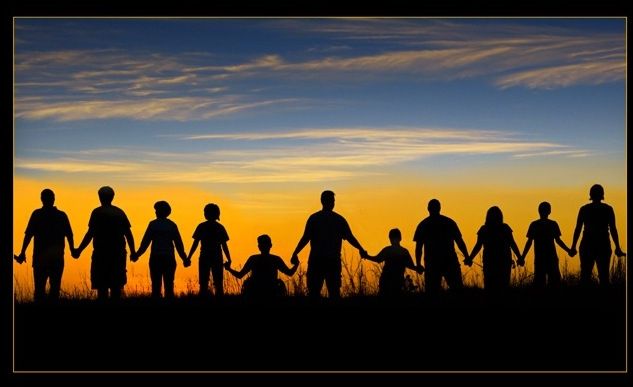
The other “side” might have a different worldview that causes them to vote a different way than you, to want different policies … but underneath, we all have the same tender hearts. And by finding this common ground, we can reconnect to each other in a compassionate way.
Original here:
https://zenhabits.net/election/
Frontiers of Learning – The Bahá’í Faith
As Baha’is around the world celebrated the last day of Ridvan and the Baha’i world witnessed the election of the Universal House of Justice, the Baha’i World Centre has just released a wonderful new film entitled Frontiers of Learning.
This uplifting film captures the insights and experiences of four different communities on four different continents. In these communities, children, junior youth, youth, and adults are all taking part in a process of community building based on concepts enshrined in the Baha’i Teachings.
Filmed in Canada, Colombia, India, and the Democratic Republic of the Congo, Frontiers of Learning is divided into four main parts and it is approximately 90 minutes in length. The film also has subtitles in 5 different languages, and you can either stream or download the film for free.
– See more at: http://bahaiblog.net/site/2013/05/frontiers-of-learning-new-film-from-the-bahai-world-centre/#sthash.y7tn9AGW.dpuf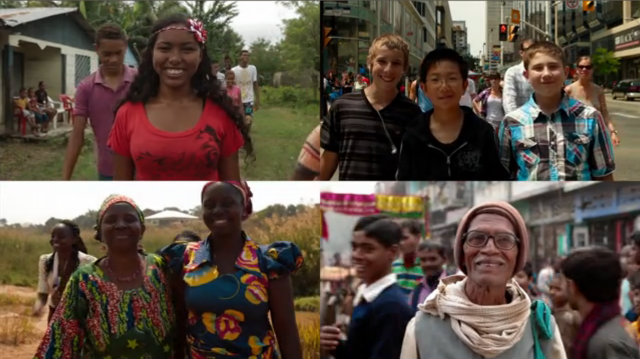
Muhammad: Legacy of a Prophet
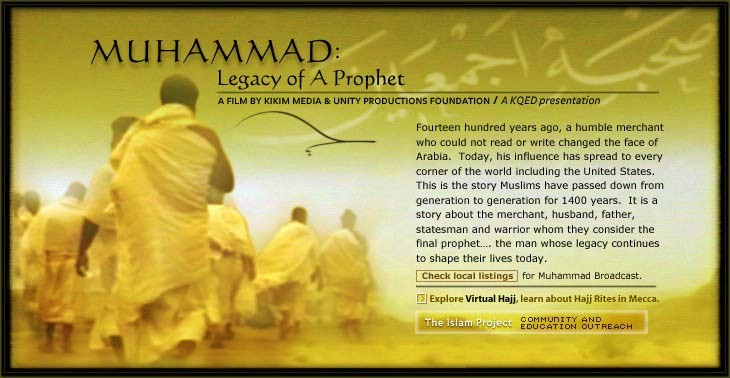 This is the story of the man who changed the world in 23 years and continues to influence it today. His father died before he was born, and his mother died when he was only six. Sheltered by a powerful uncle, he made a good start in life, established himself in a profitable business and married well. Then, at the age of 40, he was transformed. A man who could not read or write, he announced that he was the prophet of God. His name was Muhammad, and in the next 23 years he would bring peace to the warring pagan tribes of Arabia and establish the religion of Islam, which today has 1.2 billion followers.
This is the story of the man who changed the world in 23 years and continues to influence it today. His father died before he was born, and his mother died when he was only six. Sheltered by a powerful uncle, he made a good start in life, established himself in a profitable business and married well. Then, at the age of 40, he was transformed. A man who could not read or write, he announced that he was the prophet of God. His name was Muhammad, and in the next 23 years he would bring peace to the warring pagan tribes of Arabia and establish the religion of Islam, which today has 1.2 billion followers.
Three years in the making, “Muhammad: Legacy of a Prophet,” travels in the footsteps of the prophet to the Arabian desert and the holy city of Mecca where much of Muhammad’s story unfolded. But the film does not just stay in the past. Much of it’s story is told through the observations of contemporary American Muslims, including a fireman at the World Trade Center on September 11, 2001 a second generation Arab-American family building a community based on Islamic principles, a Congressional Chief of Staff working for justice, and a refugee fleeing religious persecution, whose experiences in some way echo Muhammad’s life. With some of the world’s greatest scholars on Islam providing historical context and critical perspective, “Muhammad: Legacy of a Prophet” is history in the present tense. It tells of intrigue and faith, bitter persecution and the birth of a holy book, brutal war and brilliant diplomacy in a desert environment where tribal allegiance was often the only protection.
His father died before he was born, and his mother died when he was only six. But sheltered by a powerful uncle, he made a good start in life, established himself in a profitable business and married well. And then, at the age of 40, he was transformed.
A man who could not read or write, he announced that he was the prophet of God.
His name was Muhammad, and in the next 23 years he would bring peace to the warring pagan tribes of Arabia and establish the new religion of Islam, which today has 1.2 billion followers.
Three years in the making, Muhammad: Legacy of a Prophet travels in the footsteps of the prophet to the Arabian desert and the holy city of Mecca where much of Muhammad’s story unfolded. “There are six to seven million Muslims here in America, where Islam is the country’s fastest growing religion, but many Americans are completely unfamiliar with the life story of the remarkable man who founded this religion 1400 years ago,” says producer/director Michael Schwarz.
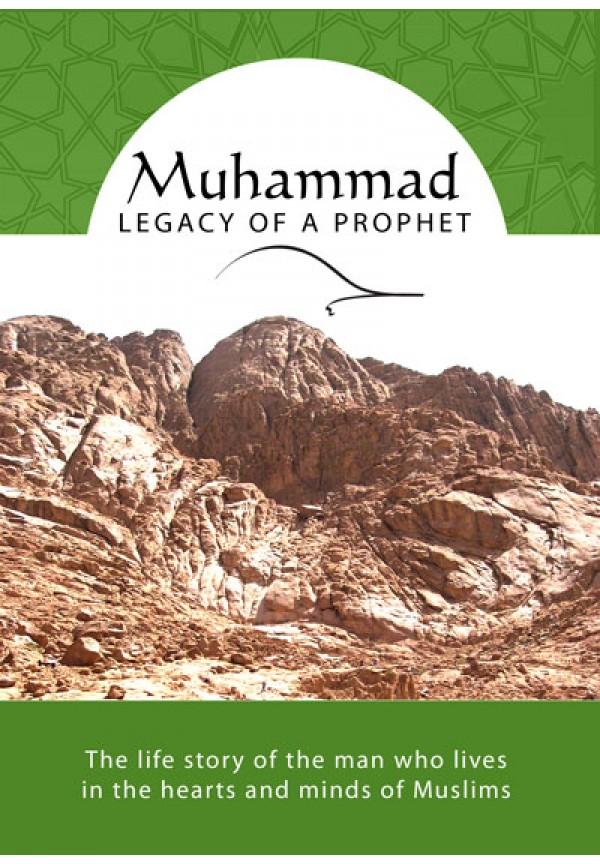 This sweeping two-hour documentary goes well beyond the boundaries of the past. “Muhammad is ‘history in the present tense,'” says co-creator/producer Michael Wolfe, a well-known Muslim author. “In it, we reflect on this 7th century story through the experiences of 21st century Americans who feel deeply connected to what Muhammad did, said and believed.” A presentation of KQED/San Francisco, the documentary is produced by Kikim Media and Unity Productions Foundation. Muhammad: Legacy of a Prophet was created and produced by Michael Wolfe and Alexander Kronemer, and produced and directed by Michael Schwarz. Noted actor André Braugher is the narrator. With some of the world’s greatest scholars on Islam providing historical context and critical perspective, Muhammad: Legacy of a Prophet tells of intrigue and faith, revolutionary ideas and bitter persecution, brutal war and brilliant diplomacy in an arid desert where tribal allegiance was often the only protection. Muhammad was orphaned as a child, but he was fortunate to be born into the powerful tribe of the Quraysh in the city of Mecca, a regional pilgrimage site and commercial crossroads. He became a successful trader based in this cosmopolitan center and married a woman who was a wealthy merchant. Yet as Muhammad prospered with the city, he saw that the poor were increasingly neglected and hedonism dominated the culture.
This sweeping two-hour documentary goes well beyond the boundaries of the past. “Muhammad is ‘history in the present tense,'” says co-creator/producer Michael Wolfe, a well-known Muslim author. “In it, we reflect on this 7th century story through the experiences of 21st century Americans who feel deeply connected to what Muhammad did, said and believed.” A presentation of KQED/San Francisco, the documentary is produced by Kikim Media and Unity Productions Foundation. Muhammad: Legacy of a Prophet was created and produced by Michael Wolfe and Alexander Kronemer, and produced and directed by Michael Schwarz. Noted actor André Braugher is the narrator. With some of the world’s greatest scholars on Islam providing historical context and critical perspective, Muhammad: Legacy of a Prophet tells of intrigue and faith, revolutionary ideas and bitter persecution, brutal war and brilliant diplomacy in an arid desert where tribal allegiance was often the only protection. Muhammad was orphaned as a child, but he was fortunate to be born into the powerful tribe of the Quraysh in the city of Mecca, a regional pilgrimage site and commercial crossroads. He became a successful trader based in this cosmopolitan center and married a woman who was a wealthy merchant. Yet as Muhammad prospered with the city, he saw that the poor were increasingly neglected and hedonism dominated the culture.
One day in the desert, while meditating in a mountain cave, Muhammad was struck by a revelation that changed his life and the world. Terrified by the force of the experience, he began to recite words that came to him, words he said were from God. These messages would continue throughout the rest of his life. Unable to write them, he would repeat them to his growing band of followers until they became part of their collective memory. Slowly these revelations began to form the book we now know as the Qur’an (or Koran). While people were shocked by these claims, “they acquired credibility because of the very nature of the words spoken,” says M. Cherif Bassiouni, professor of law at DePaul University. How could an illiterate man make up language of such poetry and wisdom?
The new faith and ideas that Muhammad proclaimed as the Word of God, were a threat to the Meccan establishment. Muhammad’s pronouncement that there was only one God, particularly threatened the very livelihood of the rich Meccans who profited from Mecca’s role as Arabia’s most popular pilgrimage center. Through years of harrassment and deprivation, and trading sanctions imposed against his people, Muhammad continued to preach and share revelations with his followers, calling on them to worship one God, to destroy idols and to practice charity. As the community faced growing hostility, he began to encourage Muslims to move across the desert and settle in the oasis town of Yathrib, later called Medina. When word of an assassination plot reached him, Muhammad barely escaped death and managed to join the growing Islamic community in Medina.
“Unlike Jesus or the Buddha, who seem to have been purely spiritual leaders with no temporal responsibilities whatever, Muhammad found himself now head of state,” author Karen Armstrong points out. “Having transferred the Muslim families from Mecca to Medina, he now had to make sure they could survive there.” Muhammad proved to be a strategically gifted military leader and a creative diplomat in the turbulent period that followed. A series of bloody battles between the Meccans and Muhammad’s followers almost destroyed the nascent faith, but then the tide turned. Ultimately Muhammad was able to lead 100,000 Muslims back to Mecca for the Hajj, a pilgrimage that remains a cornerstone of the spiritual life of Muslims.
While recounting the story of Muhammad, a tale that was carefully passed down as oral history in the 7th century and subsequently recorded, the documentary also conveys what many American Muslims believe Islam teaches, and how their beliefs shape their lives. The documentary takes viewers into the homes, mosques and work places of some of America’s Muslims to discover the many ways in which they follow Muhammad’s example and interpret his life and his message today. Through these inter-linked narratives, the filmmakers connect past and present, prophet and follower, within an innovative film structure.” Co-creator/producer Alex Kronemer says, “Many Muslims believe that if you want to understand who they are, the best place to start is with this story of Muhammad, because he established a model of behavior and values which Muslims strive to emulate today.”
The American Muslims that the documentary introduces include recent immigrants, Muslims whose families have lived here for generations, and American converts like Kevin James, a Brooklyn fire marshal, who has a Jewish mother and a father who is Native American and African American.
“America is a racial nation,” says James. “Either you’re Black, you’re White, you’re Italian, you’re Jewish, you’re this, you’re that. So coming from a mixed background, I’ve felt like, kind of in limbo.” After a period of spiritual seeking, James discovered a kinship with Islam, in part because it shares religious roots with both Judaism and Christianity and in part because it preaches racial equity. His faith inspired his decision to become a firefighter he explains, “The Qur’an teaches you that the saving of one life is as if you’ve saved all of humanity.”
A critical care nurse, Najah Bazzy is a second generation Muslim American who lives in Dearborn, Michigan. Her hometown has seen a massive influx of Muslim immigration as a result of the Gulf War. As she helps her colleagues understand and work effectively with their Muslim patients and her husband negotiate life with a teenage daughter, Bazzy says that Muhammad is her constant guide. “We live our lives through his examples, but he’s not God,” she explains. “Our reverence is to God. And our reference is to [Muhammad]. So how I walk, and how I speak, and how I carry myself, and how I treat my husband, and how I treat my mother and my father, and how I behave as a sister and a daughter and a nurse and a friend and a neighbor, that’s all prophet Muhammad in action.”
Although this documentary was well into production prior to 9/11, some of the American Muslim characters who help tell Muhammad’s story were filmed after the attack. These sequences portray their reaction to this event, the aftermath they have experienced, and the controversial concept of jihad. Through a combination of commentary from Islamic experts and interviews with Muslim Americans, the program also addresses some of the difficult issues at the matrix of religious faith, cultural customs and Middle East politics, including women’s rights and charges of anti-Semitism rooted in the historical conflicts of the 7th century.

